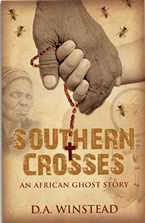July 29, 2012
Southern Crosses
D.A. Winstead
ISBN: 9781935586876
Aviva Publishing (2012)
New Novel Southern Crosses Juxtaposes American South and South Africa
 In his intricately woven new novel, Southern Crosses, D.A. Winstead offers an interesting perspective on the American South, South Africa, and the Foreign Service.
In his intricately woven new novel, Southern Crosses, D.A. Winstead offers an interesting perspective on the American South, South Africa, and the Foreign Service.
The story begins when Sarah Johnson is appointed to a new position in the U.S. Embassy in South Africa. As she flies from her former assignment in London to Johannesburg, she decides to read Harper Lee’s classic To Kill a Mockingbird. During this time, we learn about Sarah’s own life growing up as an African American in North Carolina during a time when the schools were first being integrated in the 1960s. Reading To Kill a Mockingbird triggers her memories of the past, and she offers a fresh perspective on the classic novel that is usually hailed as a masterpiece, but into which Johnson can poke some holes because of her own African American roots.
For American readers like myself, who may not be very familiar with South Africa’s history, other than knowing the basics about apartheid and Nelson Mandela’s imprisonment followed by his presidency, I thought Winstead was very clever in juxtaposing the American South with South Africa; he provided an entry point for me to understand South African history, and he prepared me for the important mission Sarah will attempt to fulfill once she arrives in South Africa.
Sarah is part of a private female alliance that is determined to improve the United States’ perception in other countries, primarily by destroying the careers of less than deserving members in the Foreign Service, or at least exposing why those people are undeserving. Ambassador Tellson of South Africa is Sarah’s target this time. Sarah realizes that as a black woman competing with the upper echelons of the U.S. Government, she needs to be tough; in fact, she has learned it the hard way, having been mistreated in her career in the past by those above her:
Has my anger dissipated? The answer is no, and this is the reason, the only reason, that my alliance with Doris, Whitney, Margo, and Carole Lynn is strong and unbreakable. Anger still runs through my veins like ice-cold blood, but anger cuts both ways. You can keep it all inside and let it eat you alive, or you can use it to do good things. I chose the latter, and I truly believe that friends who plot together stay together—and will rise to the top if they are very lucky.
In Sarah’s desire to use her anger to create change for the good, she is called upon by three women—one of whom is really a ghost—to right a wrong from the past that dates back to the Sharpeville Massacre of 1960. In the process, she learns the strange and entrancing tale of these three women, which is filled with murder, ancient bush rituals, Africanized Christian religious fervor, and abiding faith.
As Winstead’s characters realize, we all have our own crosses to bear, and for these characters, the Southern Cross in the sky can help to lead the way home.
I found “Southern Crosses” fascinating for how it reads like a piece of American Southern literature and also postcolonial literature. It offers fresh perspectives on the Civil Rights movement and the racism of the United States, as well as the racism and apartheid of South Africa, and in the end, it offers a vivid portrait of hope. Toward the novel’s end, one character states: “That is what’s so great about South Africa; when the blacks were freed, the majority chose to forgive the minority and move on. I love South Africa!” While Winstead does not deny the poverty and the problems yet to be overcome, his characters are optimistic for the future.
I was also wholly engrossed in the bush rituals presented in the book, including the supernatural event that occurs that might leave readers a little spooked. There is an element of magical realism in the character of Mary Margaret, a ghost who lives with her family members and is present and visible to them. Winstead explains this Christian and bush ritual blending in the novel before a ritual is held by the three women:
The Bible warns us to stay away from soothsayers when our future seems bleak. The Bible tells us not to succumb to temptation or trust non-traditional solutions over plain old prayer and meditation. But for Christians in Africa and other places where syncretism and folklore is common, it is often impossible to separate the two. Supernatural folklore has been a part of their culture for centuries; for them the Bible or the Koran isn’t enough to prove certain things. Prayer and meditation work fine most of the time, but at other times, we need, even require, more. Bottom-line, if there is a hell, there must also be a heaven. And that’s all we’re hoping for.
The entire scenario and the delivery of this book will leave readers reminded of novels like Beloved by Toni Morrison and No Telephone to Heaven by Michelle Cliff. Winstead is a fresh new voice in postcolonial literature that I welcome. This novel is one that really can only be described by experiencing—and savoring—it.
— Tyler R. Tichelaar, Ph.D. and award-winning author of “Spirit of the North”

